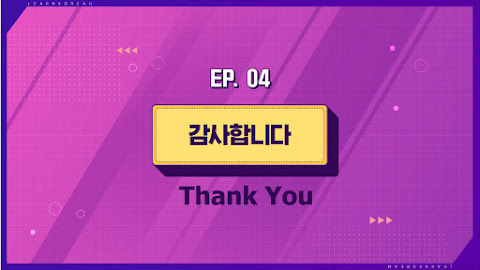Learn Korean With BTS~ EP04. Thank you.
Hello! Welcome to Episode 4 of BTS' Learn Korean With BTS!~
------------------------------------------------------
If you want read my post from Episode 1, you could read my post here:
(It contains explanations about the vocabularymentioned in the video)
If you want read my post from Episode 2, you could read my post here:
(It contains explanations about introducing oneself from the video)
If you want read my post from Episode 3, you could read my post here:
Learn Korean With BTS~ EP03. How have you been?
(It contains explanations about saying 'How have you been?', 'It's been a long time', and 'Have a nice day' from the video.)
If you want to learn how to read or write Hangeul, you could learn it here:
(This lesson is composed of Korean Alphabet, proper pronunciation and syllable structure)
------------------------------------------------------
Episode 4 of Learn Korean With BTS series is entitled "Thank you"
Note: It is much better if you watch the video of this episode in Weverse first then re-watch it while reading this post.
Watch Learn Korean with BTS EP01~04 here:
The lesson is about saying "Thank you" in Korean
TYPES OF SAYING THANK YOU
(According to BTS)
1.) 감사합니다
"감사합니다 sounds official and polite. It is used to express one's gratitude to someone older than you or in a formal setting." - from the video.
You could also say 감사합니다 if you are not familiar with the person and that person looks older than you. It is safe to be polite especially if it is the first time you are meeting someone.
Just like in the video, they said '감사합니다' when they received the award because the awards show is considered a formal event. Other formal events include Wedding, News, Public Event, Formal occasions, Official meetings, etc.
Let's see how our boys say 감사합니다~~~
VOCABULARY TIME!!!!
정말 means very, truly or really.
It is placed before 감사합니다
정말 감사합니다 means Thank you very much.
"고마워요 is a greeting in an informal context. When the speaker wishes to express gratitude to the listener who is younger or same age." - from the video.
고마워요 is less formal than 감사합니다. It is more of a casual polite form. For me, it can be said to someone older (but not too much older) that you know you can be not too formal with. Or younger but in a formal setting~ Vlive or any type of broadcasting is still considered a formal setting and I know the boys want to use a polite form of language to ARMYs. Thus, they use either 감사합니다 or 고마워요.
Let's see how our boys say 고마워요~~~
VOCABULARY TIME!!!!
너무 means very
It is placed before 고마워요
너무 고마워요means Thank you very much
Let's practice 감사합니다 and 고마워요.
BONUS!!!!
고마워
This is the informal and not polite form of thank you. It is used if you are talking to someone with the same age (that you consider a friend or very close relationship with) or younger. It is safe to use this to babies or toddlers or with very high gap of age.
REMEMBER!!!! DO NOT USE THIS KIND OF LANGUAGE (고마워) TO SOMEONE YOU MEET FOR THE FIRST TIME BECAUSE IT IS RUDE.
NEVER USE THIS TO SOMEONE WHO IS OLDER THAN YOU UNLESS THE OTHER PERSON INSISTED OR AGREED THAT YOU CAN SPEAK COMFORTABLY (REMOVE THE POLITENESS)
-----------------------------------------------------------------
Did you like this post? Comment and Share!
For more Korean related post and of course, BTS posts, you could subscribe to this blog or Like our Facebook Page Below!
Note: I want to encourage you guys to learn the Hangeul so that further learning in Korean will be much convenient for everyone~
LEARN HOW TO READ AND WRITE HANGEUL HERE:
Like our page at:
Facebook:
www.facebook.com/ExploringKorean
Follow me at:
Twitter (Personal/Stan account):
www.twitter.com/rikakanashi
(Translator account):
www.twitter.com/BTS_nunaPH
Subscribe at:
Youtube:
www.youtube.com/user/rikakanashi
www.facebook.com/ExploringKorean
Follow me at:
Twitter (Personal/Stan account):
www.twitter.com/rikakanashi
(Translator account):
www.twitter.com/BTS_nunaPH
Subscribe at:
Youtube:
www.youtube.com/user/rikakanashi

















Comments
Post a Comment